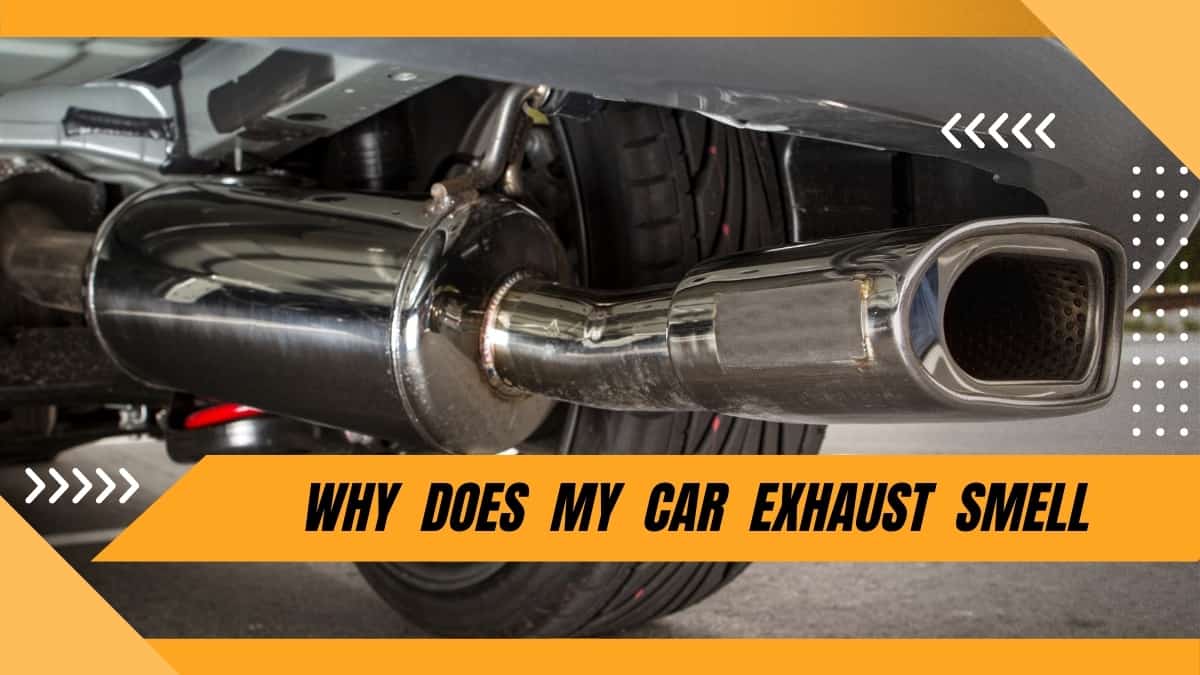
If you’ve been asking yourself “Why does my car exhaust smell”, then this article is for you.
Cars and small commercial vehicles are responsible for 10% of Australia’s greenhouse gas emissions. Almost all cars other than the EVs produce exhaust gases.
People don’t typically pay attention to the exhaust system of their car, but it’s alarming when it starts to smell differently.
In addition to being unpleasant, a car’s exhaust smell is harmful and, unlike greenhouse gas emissions, can cause immediate lung damage.
As they contain dangerous substances, exhaust gases from your car should not be inhaled. So, if you notice a car exhaust smell, you should have it fixed as soon as possible.
Let us now understand the reasons behind your car exhaust smell. There can be a variety of reasons for something like this to happen. Driving along and smelling your car emit a musty, smoky, or burning odor might be worrisome.
If the engine components are burning then, it should be repaired immediately to limit further harm. However, sometimes something as small as a minor leak can be the source of these unpleasant odors.
It is quite unpleasant to drive in a car whose exhaust has a strong smell. In addition to being dangerous, it may also be toxic.
The toxic substances included in your car’s exhaust emissions include nitrogen oxides, formaldehyde, benzene, sulphur dioxide, and soot.
All of these substances are toxic to the human body, especially if inhaled frequently and in excessive doses. But, what exactly are the reasons for such a strong exhaust smell?
A car’s catalytic converter transforms the dangerous substances in your car’s exhaust fumes into less dangerous ones before they exit the tailpipe.
In Australia, if a vehicle was built to have a catalytic converter, driving it without one is against the law. A $10,000 fine may be imposed for removing it. Hence, everyone should have it installed in their cars.
Sulphur is one of the byproducts of combustion that the catalytic converter breaks down and neutralises. Over time, the catalytic converter may become dirty and blocked. So, the sulphur produced during combustion can stop being broken down.
The catalytic converter may eventually overheat, get contaminated with gasoline from the exhaust, or just wear out. You might detect a sulphurous rotten egg smell emanating from the exhaust when this occurs. Additionally, you’ll observe decreased fuel efficiency and acceleration performance.
When this happens, you should consult a qualified technician repair to get your converter replaced. It is very important to do so because if your government rules, you might not be able to pass emissions testing.
You may just have an exhaust leak behind the catalytic converter if you start to smell bad in the cabin, which will smell vaguely musty and smoky.
This can be due to a broken exhaust pipe or a damaged muffler. Car mufflers are found at the bottom of the rear of your car and are a component of the exhaust system. They help to reduce exhaust pollutants and engine noise.
One of the main functions of a car muffler is to reduce the number of pollutants a vehicle produces in the environment. It is unable to effectively maintain pure air when it is in bad condition.
Broken mufflers can also make incredibly loud noises that annoy other drivers and increase noise pollution. A damaged muffler not only makes more pollution but also makes your car use more fuel, which overall harms the environment.
Hence, the exhaust leak must be inspected as soon as you notice any strong odor otherwise, your car would be a significant cause of environmental pollution and would increase your vehicle’s fuel economy as well.
Gasoline-like exhaust is a symptom that the air/fuel ratio in the engine is incorrect and that too much fuel is being mixed with insufficient oxygen.
A more frequent cause of the odor of gasoline in the cabin is a rich air/fuel mixture dumping some unburned gasoline into the exhaust. The computer is unable to automatically make up for either too much fuel being added to the engine or not enough air reaching the engine.
A backfire or damage to the catalytic converter might also result from gasoline getting into the exhaust. You’ll detect that weird filling station odor.
The exhaust pipe may emit black smoke as well. Things like a clogged engine air filter, leaking fuel injectors, a bad throttle body, a bad mass airflow sensor, or a bad oxygen sensor are the most typical causes of this.
It can be unpleasant to suddenly detect strange odors in your car. Hazardous substances present in the exhaust emissions such as carbon monoxide are quite harmful to your health.
Your eyes may become scratchy from those exhaust emissions. As quickly as possible, you should avoid prolonged contact with these harmful gases. How can you fix the problem?
The catalytic converter must be checked and, if necessary, replaced. A broken or clogged catalytic converter would make your engine run in less than ideal conditions, which is bad for engine performance and longevity and may cause you to fail emissions testing if left unattended.
If your car is older than 5 years, you should have the exhaust system checked out regularly, ideally once or twice a year, to look for exhaust leaks, loose pieces, corroded parts, and other elements that have been damaged.
Even if the exhaust pipes and the muffler appear to be fine after examination, make sure to carefully verify the connections between the components because driving on rough terrain might cause them to corrode or become loose.
If you smell bad fumes, it could mean that something is wrong with your vehicle. An exhaust leak is the most likely culprit for an odour of exhaust in your car’s cabin. The exhaust system on your car is substantial and virtually the entire length of the car. As a result, it may be challenging to identify the leak’s exact source. Therefore, it is ideal to take your car for servicing.
If you notice a smell that is similar to a rotten egg, the catalytic converter has likely failed. Hence you should take your car to a repair shop. In addition to making your car smell bad, a damaged catalytic converter can also make your automobile less efficient, pollute the environment more, and fail emissions testing.
If you smell gasoline in the cabin, it is probably because of the rich air/fuel mixture. Unburned gasoline is being released into the exhaust due to a rich air/fuel combination. Additionally, gasoline that enters the exhaust can harm the catalytic converter or create a backfire as well. Get your car for service as soon as possible!
An exhaust leak from the car exhaust system can lead to the improper treatment of harmful gases, which can result in issues including cabin odors.
Many of these dangerous gases have no smell, so you won’t be aware that they are seeping into the passenger compartment.
You and your passengers may become ill if exposed to these fumes for a lengthy period. Here are a few signs you should be aware of beforehand.
Your vehicle’s air-to-fuel ratio balance may be thrown off if it has an exhaust leak. Inefficient engine operation can result from improper air-to-fuel ratio, which lowers the engine’s overall fuel efficiency.
When accelerating, especially, keep an eye out for a loud rumbling. Additionally, while the engine is operating, you might occasionally hear hissing or popping sounds.
When you press the gas pedal, your car might not accelerate as quickly as it usually does. If the exhaust leak isn’t Okay, your car will keep losing power.
So, that’s it for today’s blog. I hope now you know the answer to Why does your car exhaust smell.
Car exhaust smells are quite a common problem for car owners. It is quite unpleasant to drive in a car that smells like exhaust, but it is also harmful and possibly toxic. Exhaust gases can enter a car’s cabin for a variety of causes.
You can narrow down or pinpoint the cause of the issue to have it looked at depending on the specific sort of smell as well as additional visual and audible clues. Exhaust leak, rich air/fuel mixture ratio and defective catalytic converter can be a few of the causes.
To check for exhaust leaks, loose parts, corroded parts, and other damages to parts, get your catalytic converter and exhaust system tested regularly, ideally once or twice a year. You should fix the minor dents and leaks in the exhaust system before they develop into more costly issues.
Fill out the contact form and we will call you as soon as possible discuss events, membership or any general enquiries.
